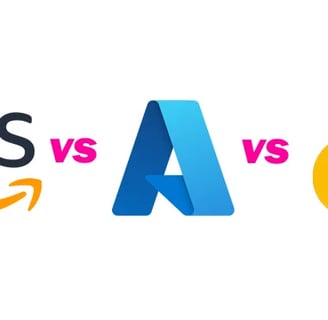Artificial Intelligence and Machine Learning on AWS, Azure, and GCP
As we explore the world of cloud computing, we're often asked about the best platform for building and deploying AI-powered applications. In this blog post, we'll dive into the capabilities of AWS, Azure, and GCP for artificial intelligence and machine learning.
tecpeopleAI
3/1/20242 min read


AWS: The Leader in AI-Powered Cloud Computing
Amazon Web Services (AWS) has been a pioneer in the cloud computing space, offering a wide range of AI-powered services. With its extensive expertise in natural language processing, computer vision, and machine learning, AWS is well-positioned to help organisations build and deploy AI-powered applications.
Source: AWS SageMaker is a fully managed service that provides a range of algorithms for machine learning, including neural networks and decision trees.
Example: Amazon Rekognition is a deep learning-based image analysis service that can identify objects, people, and text in images.
Azure: The Cloud Powerhouse
Microsoft Azure is another major player in the cloud computing space, offering a suite of AI-powered services. With its extensive expertise in machine learning, computer vision, and natural language processing, Azure is well-positioned to help organizations build and deploy AI-powered applications.
Source: Azure Machine Learning is a fully managed service that provides a range of algorithms for machine learning, including neural networks and decision trees.
Example: Azure Cognitive Services provides a range of AI-powered services, including speech recognition, facial recognition, and natural language processing.
GCP: The Innovator
Google Cloud Platform (GCP) is known for its innovative approach to cloud computing, offering a suite of AI-powered services that leverage Google's extensive expertise in machine learning. With its emphasis on collaboration and transparency, GCP is well-positioned to help organizations build and deploy AI-powered applications.
Source: Google Cloud AI Platform provides a range of machine learning algorithms, including TensorFlow and PyTorch.
Example: Google Cloud Vision API uses deep learning-based image analysis to identify objects, people, and text in images.
Comparing the Three: A Closer Look
While all three cloud providers offer AI-powered services, there are some key differences between them. Here's a closer look at each:
AWS SageMaker vs Azure Machine Learning: Both AWS SageMaker and Azure Machine Learning provide fully managed services for machine learning, including neural networks and decision trees. However, AWS SageMaker has more extensive support for deep learning-based models.
Google Cloud AI Platform vs AWS SageMaker: Google Cloud AI Platform provides a range of machine learning algorithms, including TensorFlow and PyTorch. While AWS SageMaker also supports these frameworks, GCP's emphasis on collaboration and transparency sets it apart from AWS.
Azure Cognitive Services vs Google Cloud Vision API: Azure Cognitive Services provides a range of AI-powered services, including speech recognition, facial recognition, and natural language processing. Google Cloud Vision API uses deep learning-based image analysis to identify objects, people, and text in images.
Real-World Examples:
Healthcare: A healthcare organisation uses AWS SageMaker to build a machine learning model that predicts patient outcomes based on medical data.
Retail: An e-commerce company uses Azure Cognitive Services to analyze customer behavior and optimize inventory management.
Finance: A financial institution uses GCP's Cloud AI Platform to build a machine learning model that detects fraudulent transactions.
Conclusion:
In conclusion, AWS, Azure, and GCP all offer robust AI-powered services for building and deploying AI-powered applications. While there are some key differences between the three cloud providers, each has its strengths and weaknesses. At tecpeopleAI, we're experts in AI technology and can help you choose the best platform for your organisation's needs.
Recommendations:
Start with what you know: If your organisation is already invested in a particular cloud provider, start by leveraging their AI-powered services.
Consider your specific use case: Think about the specific problem you're trying to solve and which cloud provider's AI-powered services are best suited for that solution.
Experiment and innovate: Don't be afraid to experiment with different cloud providers' AI-powered services and see what works best for your organisation.
In our next blog post, we'll explore more advanced topics in AI technology, including explainable AI and transfer learning. Stay tuned!
HERE TO HELP
We help you understand the complex world of AI and how to implement simple AI processes to improve your business
© 2024. All rights reserved.


